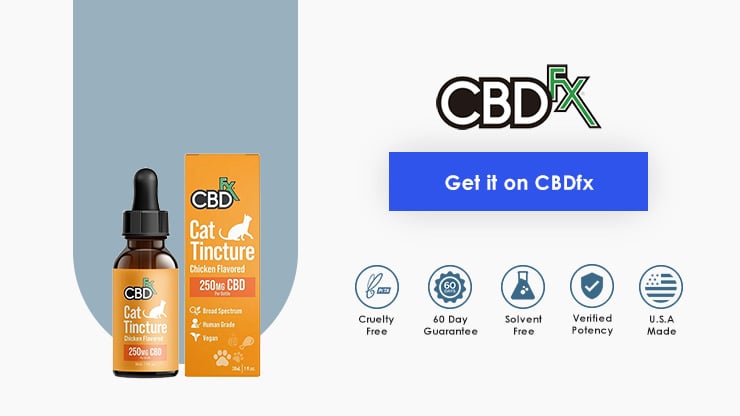Best 7 CBD Oils For Cats with Cancer

Table of Contents
CBD, or cannabidiol, is a phytocannabinoid sourced from the Cannabis sativa plant. Cannabidiol for cats with cancer is extracted from the hemp variety of cannabis and features health-boosting properties.
Cats with cancer benefit from CBD oil supplementation. CBD oil interacts with the endocannabinoid system (ECS), thus supporting a state of health and balance. CBD is a natural, alternative remedy and has few benign side effects in rare cases.
CBD oil and cancer are closely connected. CBD oil contains powerful anti-cancer features and is safe to use in combination with mainstream cancer treatments. CBD for cats with cancer helps treat the tumor and alleviate cancer symptoms.
CBD for cats has minor side effects in some cats, such as lethargy, dry mouth, and altered liver enzymes, but the overall benefits of CBD oil for cats with cancer outweigh the risks.
The 7 best CBD oils for cats with cancer are listed below.
- Honest Paws CBD Oil (Best Overall). An organic full-spectrum, human-grade CBD Oil using premium CO2 extraction methods that reduces pain and seizures, prevents metastasis, and shrinks tumors in cats with cancer.
- CBDfx CBD Oil. A human-grade, organic, broad-spectrum CBD oil using coconut-derived MCT as a carrier. The CBDfx Cat Tincture offers the best flavors in CBD for cats with tumors.
- Penelope’s Bloom CBD Oil. A full spectrum salmon flavored oil designed to act fast. Penelope’s Bloom CBD Oil for Cats is the best fast-working formula for cats with cancer.
- Batch CBD Salmon Oil. The CBD oil is vegan, natural, THC-free (less than 03%), and available in bacon and salmon flavors. Batch Pet CBD Oil Tincture is the best vegan option for cats experiencing cancer.
- Joy Organics CBD Oil. A broad spectrum, 100% THC-free, organic CBD oil that supports cancer symptoms like anxiety, joint inflammation, and pain, as well as the anti-cancer properties. Joy Organics CBD Oil is the best broad-spectrum formula for cats suffering from cancer.
- Petly CBD. A very strong broad-spectrum CBD oil with a salmon flavor for easy dosage. Petly Pet Hemp CBD Oil is the best high-potency oil for cats dealing with cancer.
- NuLeaf Naturals. A premium formula with a rich spectre of cannabidiols that treat and support cat cancer symptoms. NuLeaf Naturals Pet CBD Oil is the best budget-friendly option for cats with cancer.
1. Honest Paws CBD Oil
The Honest Paws CBD Oil for Cats is a human-grade, full-spectrum oil rich in various cannabinoids. The cannabinoids feature strong anti-cancer features, thus benefiting cats with cancer.
The product is extracted from organic, USA-grown hemp using supercritical CO2 methods for maximum purity. The oil has a concentration of 125 mg of CBD per bottle and comes with a user-friendly dropper.
The Honest Paws CBD Oil for Cats supports overall health, helps with cancer, promotes natural relaxation, boosts joint health, and provides seizure control. The oil is suitable for cats of all ages.
The main pros of the oil are the full-spectrum CBD extract, the use of organic hemp, and the affordable price. The only con is the lack of cat-friendly flavors for better product palatability.
The Honest Paws brand recommends giving one full dropper a day for cats of all sizes.
The Honest Paws CBD oil costs $39.95 per bottle.
Pet owners say the Honest Paws CBD oil works great, tastes delicious, and is simple to use. Customers are excited about the oil and recommend it to potential buyers. The Honest Paws CBD Oil is the best overall hemp product for cats with cancer.
“My kitty has lymphoma and was given 3 weeks-3 months. He’s been living more than 11 months since diagnosis (no chemo). He’s on a steroid and L-Lysine, spirulina, given herbs, mushrooms, supplemental foods. This month I added CBD thinking he could be in pain at times and agitated. I think he seems calmer and hope this is helping.”
2. CBDfx
The CBDfx CBD Oil for Cats is a broad-spectrum formula made with top-notch ingredients, like organic hemp and coconut-derived MCT (medium-chain triglyceride) oil. The cannabinoid profile is beneficial for cats with cancer.
The oil is packed with 250 mg of CBD per bottle and is suitable for larger cats with cancer. The cat CBD product has two flavors (chicken and bacon) and a graduated dropper bottle for simple use.
The CBDfx CBD Oil for Cats promotes general wellness, offers cancer support, boosts joint health, promotes relaxation, and helps with seizure control. The oil is suitable for cats of all ages.
The main pros of the oil are the human-grade formula, and the availability of delicious chicken flavor cats adore. The con is the use of broad instead of full-spectrum CBD extract.
The CBDfx brand recommends giving half a dropper of CBD in the morning and half at night. Start with a third or fourth of a dropper when a cat is starting cannabis.
The CBDfx CBD Oil for Cats is available at a price of $34.99.
Cat owners say the CBDfx Cat Tincture is a great product that makes a difference. Customers are satisfied with the oil’s effects and flavors. Overall, the CBDfx Cat Tincture offers the best flavors in CBD for cats with cancer.
“My cat is 9 and she’s a picky eater. She doesn’t eat any treats, and she only eats one brand of canned cat food – so she’s that kind of picky. I had previously purchased a different brand of cat CBD that had a strong smell to it, and I’d have to wrap her up in a towel to attempt to get it in her mouth. So I didn’t have high hopes for this. But this product was a DEFINITE hit! She has no problems eating this when I put it in her food. And it definitely is working.”
3. Penelope’s Bloom
Penelope’s Bloom CBD Oil for Cats is a full-spectrum supplement formulated specifically to act fast and be easily digestible. The rich specter of cannabinoids boasts anti-cancer features fit for sick cats.
The oil contains 150 mg of CBD per bottle and is crafted with organic hemp, MCT oil, and wild Alaskan salmon. The product is USA-made, third-party laboratory tested for safety, potency, and effectiveness.
Penelope’s Bloom CBD Oil for Cats supports overall wellness, offers cancer help, reduces anxiety, promotes joint health, and helps with tremors and seizures. The oil is fit for use in cats of all ages.
The top three pros of the oil are the full-spectrum formula, all-natural ingredients, and the inclusion of salmon flavor for better palatability. The main con is the product’s frequent unavailability due to high demand and low stock.
The Penelope’s Bloom brand recommends giving one full dropper of CBD oil daily or on an as-needed basis (mixed with cat food or directly into the cat’s mouth).
The Penelope’s Bloom CBD Oil for Cats costs $34.99 per bottle.
Pet owners highly recommend Penelope’s Bloom CBD Oil for Cats, saying it is working wonders for cats with cancer. Customers are happy with the salmon flavor that makes the oil use simple. Penelope’s Bloom CBD Oil for Cats is the best fast-working formula for cats with cancer.
“Helped my cat through her hospice care. Helped relieve some of her pain during her last few months with us. Thank you for making such a helpful medicine for our beloved pets. Annabelles passing was all natural, nothing but good from this product.”
4. BATCH CBD Salmon Oil
The Batch Pet CBD Oil Tincture is loaded with three different cannabinoids (cannabidiol or CBD, cannabigerol or CBG, and cannabichromene or CBC) beneficial to cats with cancer.
The oil is sourced from organic, Wisconsin-grown hemp and third-party lab tested for purity, safety, and potency. The oil is vegan, natural, THC-free (less than 03%), and available in two flavors (bacon and salmon).
The Batch Pet CBD Oil Tincture promotes general health, provides vital cancer support, induces relaxation, helps with arthritis, and relieves seizures. The oil is suitable for cats of all ages.
The two main pros of the oil are the organic sourcing and the availability of two cat-friendly flavors. The only con is the oil’s hefty price tag compared to similar products.
The Batch brand recommends giving cats between 3 and 5 mg of CBD per 10 pounds of weight per day.
The Batch Pet CBD Oil Tincture costs $64.99 per bottle.
Pet owners highly recommend the Batch Pet CBD Oil Tincture, saying it works wonders. Customers are happy with the cat-friendly flavors that make the oil user-friendly. Overall, the Batch Pet CBD Oil Tincture is the best vegan option for cats with cancer.
“The Batch oil has been great for Louie! I will definitely buy again!”
“Superb customer experience and prompt communication! Don’t wait on providing the care of superiors CBD Batch products your beloved pet needs.”
5. Joy Organics
The Joy Organics CBD Oil for Pets is a 100% THC-free, broad-spectrum, and organic hemp product with olive oil as a carrier. The formula helps cats with anxiety and boosts overall health.
The oil is third-party, laboratory-tested, and comes with a 90-day money-back guarantee. The product is available in two potency options (450 mg and 900 mg) for simpler dosing.
The Joy Organics CBD Oil for Pets is good for overall wellness, offers cancer help, promotes relaxation, supports joint health, and helps with tremors and seizures. The oil is fit for daily use in cats of all ages.
The pros of the oil are the quality of sourcing and extracting, the use of olive oil as a carrier, and the 0.0% THC in the formula. The main con is the use of broad instead of full-spectrum extract.
The Joy Organics CBD brand recommends between 1 and 2 mg of CBD per 10 pounds of body weight.
The Joy Organics CBD Oil for Pets is available at a price of $44.95.
Pet owners describe the Joy Organics CBD Oil as a wonderful tincture. Customers say the oil makes a difference, works really fast, and is reasonably priced. Overall, Joy Organics CBD Oil is the best broad-spectrum formula for cats with cancer.
“I’ve used this on my two older cats and I think it improves their overall health. I put it in their food, and they have no problem eating it up.”
6. Petly CBD
The Petly Pet Hemp CBD Oil for Cats is formulated with phytocannabinoid-rich and broad-spectrum hemp. The blend of cannabinoids makes the supplement beneficial for cats with cancer.
The oil is sourced from organic hemp and has MCT coconut oil as a carrier. The cat supplement features 200 mg of CBD per bottle and is salmon-flavored for simple use in finicky cats.
The Petly Pet Hemp CBD Oil for Cats promotes general well-being, boosts joint health, provides cancer help, supports calmness, and helps with seizure control. The product is fit for cats of all ages.
The top two pros of the oil are the very high potency and the inclusion of salmon flavor cats love. The main con is the use of broad instead of full-spectrum extract.
The Petly brand recommends giving one full dropper a day for cats of all sizes.
The Petly Pet Hemp CBD Oil for Cats costs $39.99 per bottle.
Cat owners say the Petly Pet Hemp CBD Oil works well, and even cats with picky appetites tolerate the oil. Customers are happy and recommend the oil to other buyers. Overall, Petly Pet Hemp CBD Oil is the best high-potency oil for cats with cancer.
“My cat is just shy of 15 and is on end-of-life care for cancer. Between that and my rearranging our bedroom (which hasn’t changed in her lifetime), she’s been very stressed out. I strongly believe, however, that her nightly dose of Petly CBD Oil has helped her stay calm and comfortable through it all. I couldn’t recommend it enough.”
7. Nuleaf Naturals
The NuLeaf Naturals Pet CBD Oil is a premium quality full-spectrum formula featuring extra virgin hemp seed oil as a carrier. The rich specter of cannabinoids is helpful for cats with cancer.
The product is sourced from organic hemp extracted with supercritical CO2 for maximum purity. The oil is third-party tested, THC-free, and comes with a 60-day money-back guarantee.
The NuLeaf Naturals Pet CBD Oil is good for overall wellness, gives cancer help, promotes relaxation, supports joint health, and helps with seizures. The product is fit for daily use in cats of all ages.
The top pros of the oil are the use of full-spectrum CBD extract and the budget-friendly price. The only con worth mentioning is the lack of added flavors for better palatability in cats.
The recommended dosage by the NuLeaf Naturals manufacturer is two drops of CBD oil per 25 pounds, daily or as needed.
The NuLeaf Naturals Pet CBD Oil comes at a budget-friendly price of $19.00.
Cat owners say the NuLeaf Naturals Pet CBD Oil is working great and is easy to use. They are happy with the reasonable price of the product. Customers approve and recommend the oil. Overall, the NuLeaf Naturals Pet CBD Oil is the best budget-friendly option for cats with cancer.
“We weren’t sure if we’d be able to tell how much relief our old boy with cancer would get from this product but let me tell you, WE DID. It made all the difference in the world. We are so glad he can rest more comfortably.”
What Causes Cancer in Cats?
Cancer in cats is caused by exposure to carcinogens and unhealthy lifestyles.
Common carcinogens include tobacco smoke (second and third-hand), asbestos, x-rays, prolonged sunlight, benzene, and food additives.
An unhealthy lifestyle, particularly a lack of physical exercise and low-quality nutrition, are important risk factors in the development of cancer in cats.
Cancer is more common in senior cats, suggesting a link between cancer risk and old age.
The exact trigger of cancer in cats is rarely found. Cancer is multifactorial and typically caused by a combination of the above-mentioned risk factors.
What are the Symptoms of Cat Cancer?
The symptoms of cat cancer include lumps and bumps that change size, foul odors, slow-healing wounds and sores, appetite changes, body weight fluctuations, reduced energy, seizures, digestive distress, respiratory problems, and urinary issues.
The symptoms of cat cancer are listed and reviewed below.
- Lumps, Bumps, and Growths: The most striking symptoms of cancer in cats are lumps, bumps, or growths on the body that change size and appearance.
- Foul Odors: Cats emitting foul odors are a common symptom of cancer in cats. The most common trigger is cancer affecting the oral cavity, in which case the cat develops bad breath or halitosis.
- Slow-Healing Wounds and Sores: Reduced or lack of healing ability is another typical cancer sign. Wounds form when the lump or bumps ulcerate, and the impaired healing is due to the cancer’s debilitating effect on the cat’s immune system.
- Increased or Decreased Appetite: Cats with cancer eat more or less than usual. Eating more and eating less are both dangerous for the cat’s overall well-being.
- Body Weight Fluctuations: Appetite changes directly affect the cat’s body weight, causing weight loss or gain.
- Reduced Energy Levels: Cancer cats have reduced energy levels, sleep more, and show disinterest in everyday activities. Sudden depression in cats is concerning and requires immediate veterinary attention.
- Seizures: Seizures develop in cats with brain tumors and present with sudden and uncontrolled movements, loss of consciousness, jerking limbs, foaming at the mouth, sudden rage, and excessive biting.
- Digestive Distress: Digestive upset symptoms in cats with cancer include nausea, vomiting, diarrhea, abdominal swelling, and blood in the feces.
- Respiratory Problems: Coughing, high-pitched wheezing, chronic nasal discharge, and difficulty breathing are respiratory symptoms observed when cancer spreads to the cat’s lungs.
- Urinary Issues: Cats with bladder cancer urinate in unusual places around the house. Other urinary cancer symptoms include frequent or painful urination and blood in the urine.
How often does a Cat have Cancer?
Cancer affects one in five cats, according to the American Cancer Foundation (ACF). Over 6 million cats are diagnosed with cancer annually, and approximately 26% of the cat population dies due to feline cancer.
The four most common types of cancer in cats are mast cell tumors, lymphoma, squamous cell carcinoma, and bone cancer. Other frequently diagnosed types are injection-site sarcoma (ISS), mammary cancer, feline leukemia virus (FeLV), and brain tumors.
How does CBD Oil help treat Cats with Cancer?
CBD oil helps treat cats with cancer because it is a phytocannabinoid with antitumor and anticancer properties that support cats with cancer through the endocannabinoid system (ECS).
CBD, or cannabidiol, is a plant extract sourced from hemp. ECS is a regulatory system that manages various bodily functions and consists of endocannabinoids, cannabinoid receptors, and enzymes.
Cannabidiol binds with the cannabinoid receptors, thus promoting homeostasis or a state of balance. Studies on CBD oil and cancer describe CBD as a “promising anti-cancer drug” that help cats with cancer on various levels.
CBD for cats with cancer acts against the cancer itself. Cannabidiol induces apoptosis (programmed cell death) of cancerous cells, shrinks tumors, and prevents metastasis.
Pet CBD has strong antioxidant properties and boosts the immune system while reducing pain and inflammation, which is helpful in cats with cancer. Cannabidiol relieves pain and anxiety, often linked with cancer or cancer treatment.
CBD for cats is safe to use in combination with traditional cancer treatments, such as chemotherapy and radiation. CBD oil and CBD treats boost the efficacy of mainstream treatments and help manage the side effects of vomiting and nausea.
What is the recommended dosage of CBD Oil for Cats with Cancer?
The recommended CBD dose for cats with cancer is between 4 and 6 mg of CBD per 10 pounds of body weight. Cancer requires higher CBD amounts than the usual recommendation of between 1 and 5 mg of CBD per 10 pounds of body weight.
Start with a lower CBD dose and increase gradually as the cat gets used to the CBD supplement. Do not fret if the cat consumes more CBD than necessary, as hemp cannabis does not cause overdoses in pets.
Consult with a licensed veterinarian regarding the ideal starting CBD dose or use an online available CBD dosage calculator.
How often should CBD Oils be given to Cats with Cancer?
CBD oils should be given to cats with cancer every day. Cannabidiol needs time to build up in the cat’s body and exert positive long-term effects.
It is recommended to give CBD oils to cats with cancer every day for at least three weeks before expecting to see an improvement.
Hemp-sourced CBD products for cats with cancer are natural and safe to administer daily and up to several times a day.
How effective are CBD Oils in treating Cats with Cancer?
CBD Oils are not a miracle treatment or cure for cats with cancer, but they make an excellent addition to the anti-cancer treatment plan.
CBD for cats has anti-cancer features and helps with cancer symptoms. For example, CBD fights against the tumor by inhibiting its growth and preventing metastasis.
CBD for cats with cancer helps alleviate some of the leading cancer symptoms, such as chronic pain and inflammation.
CBD enhances the efficacy of conventional cancer treatments and helps manage their side effects like appetite loss, nausea, and vomiting.
Does CBD Oil shrink tumors?
Yes, CBD shrinks tumors. Studies have shown CBD shrinks certain types of tumors in some animals.
A study, “Cannabinoids as a Potential New and Novel Treatment for Melanoma: A Pilot Study in a Murine Model,” showed that using CBD in mice with melanoma resulted in a significant tumor size reduction and increased survival.
A similar effect was shown in another glioma cell research in 2020 titled “Cannabidiol (CBD) as a Promising Anti-Cancer Drug.” The study evaluates the CBD’s different anti-cancer properties and says that cannabidiol can “reduce the size of tumors.”
Does CBD Oil help treat lymphoma?
Yes, CBD Oil helps treat lymphoma. Feline leukemia is often mistaken for lymphoma in cats.
The American Association for Cancer Research (AACR) published a study titled “Anti-proliferative effect of cannabidiol (CBD) against B and T-cell lymphoma” in 2020. The study says that “cannabinoids have an anti-proliferative and apoptotic effect on canine lymphoma cells.”
The study is not specific to cats, but CBD has similar effects in all mammals with an endocannabinoid system. The positive effects of CBD on lymphoma and cats with cancer are likely to be possible in cats, too.
Is CBD Oil Safe for Cats?
Yes, CBD oils are perfectly safe for cats.
CBD is “very safe for cats,” according to an article on PetMD. The World Health Organization (WHO), in its critical review of cannabis, says that “CBD is generally well-tolerated, with a good safety profile.”
The use of pet CBD products for cats with cancer is skyrocketing. The answer is “yes” to the question are CBD oils safe to cats. CBD oil is safe if extracted from hemp, formulated exclusively for pets, and used correctly.
Are there any possible side effects from CBD Oils for cats with Cancer?
Yes, there are possible side effects from CBD Oils for cats with cancer such as lethargy, drowsiness, digestive issues, and loss of appetite are four potential side effects of CBD for cats.
Joan Capuzz, VMD for DVM360, wrote an article analyzing the findings of an earlier study on the effects of CBD in healthy cats. The results suggested that licking, head shaking, and pacing are common CBD side effects in cats.
The side effects of CBD oil in cats with cancer are transient and resolve once the cat gets used to the supplement and the exact CBD dose is determined.
Where to buy CBD Oils for Cats with Cancer?
Buy CBD oil for cats with cancer in pet shops and online stores. Hemp-sourced cannabis supplements are available over-the-counter.
The price of CBD products for cats varies based on the supplement types and the concentrations. The average price of a high-quality CBD oil or other cat CBD product is $30.
What are the other Cat diseases or Illnesses CBD Oils can treat?
CBD oil treats cat other cat diseases or illnesses like arthritis, anxiety, seizures, and kidney disease.
The cat diseases or illnesses CBD oils can treat are listed below.
- CBD Oil for Cats with Arthritis: CBD helps reduce inflammation and pain associated with joint problems in cats. Arthritic cats supplemented with cannabis feel more comfortable and are more active.
- CBD Oil for Cats with Anxiety: The anxiolytic properties of CBD support calmness and relaxation. Hemp products are a great natural alternative for anxious cats.
- CBD Oil for Cats with Kidney Disease: CBD helps ease the symptoms associated with chronic kidney disease in cats. Cannabis for cats manages appetite, pain, and anxiety.
- CBD Oil for Cats with Seizures: Cat CBD has strong antiepileptic and anticonvulsant features. Cannabis additionally reduces neuroinflammation and acts as a neuroprotectant, thus benefiting cats with seizures.
The effects of cat CBD on cats with cancer are similar to those of cats with seizures in terms of mechanism of action. Cannabidiol works through the endocannabinoid system and supports a state of health and balance.
CBD helps fight cancer in cats by assisting traditional anti-cancer treatment to shrink the tumor. Cannabinoids have several anti-cancer features that help reduce the size of tumors and prevent the spread of tumor cells throughout the body.
CBD promotes apoptosis and prevents angiogenesis. Cat CBD helps fight cancer by modulating the immune system through its anti-inflammatory, anti-pain, and antioxidant properties.
Traditional cancer treatment for cats includes chemotherapy and radiation. CBD oil assists traditional treatment through its natural anti-cancer properties and soothes the side effects of treatment and the disease.
Seizures are closely related to misfiring electrical impulses in the brain, which result in inflammation of the brain tissue. CBD oil for cat seizures assists with both aspects. CBD additionally has an anti-convulsant effect and inhibits seizure spread in the central nervous system. Mainstream treatment includes anti-seizure medication for cats and CBD oil is a natural addition to a long-term seizure management plan.
What are other CBD Products besides CBD Oils for Cats?
There are five hemp CBD-based products besides CBD oils for cats, including CBD treats, CBD powders, CBD capsules, CBD creams, and CBD patches.
Other CBD products for cats are listed below.
- Cat CBD Treats: CBD treats are edibles formulated with high-quality CBD oil and cat-friendly ingredients. Cannabis treats are flavored for easy use and come in pre-measured doses for simple dosing for cats with cancer.
- Cat CBD Powders: CBD powders are an excellent alternative to CBD oil. The powders are well-pulverized and mix well with cat food. Finicky cats with cancer that dislike oils are ideal animals for powders.
- Cat CBD Capsules: CBD capsules are another oral supplement but are not the best option for cats because giving pills or capsules to cats is challenging.
- Cat CBD Creams: CBD creams and balms are formulated for topical use and are straightforward to implement into the daily routine. Ensure the cat does not lick the cream before absorption because it reduces the effectiveness of the cream. Licking the cream does not harm the cat
- Cat CBD Patches: Patches are topical CBD products that are applied to the naked skin. The body heat releases the cannabinoids within the patch, which are then absorbed through the skin.























